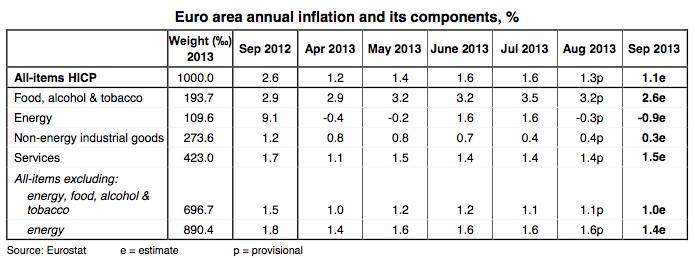September inflation dropped in the Euro zone to 1.1% annualized, from 1.3% in August, according to a flash estimate by Eurostat, the European Union’s statistics office.
Markets had expected September’s Euro zone inflation to be 1.2%. A poll of Economists last week carried out by the Wall St. Journal had expected the consumer-price index to slow to 1.2%.
Experts believe that with current low inflation figures, the European Central bank is likely to carry on with its loose monetary policy in its drive to boost the bloc’s economy.
The European Central Bank (ECB) meets on Wednesday in Paris. Most analysts believe the ECB will not alter interest rates. Some think they might even vote for a cut.
Target – Keep Euro zone inflation below 2 percent
The ECB’s target for Euro zone inflation is to keep it below 2%. It expects this years’ overall inflation rate to range between 1.4% and 1.6%. Most economists agree with their estimate.

The BBC quoted James Howat, European economist at Capital Economics, as saying “The ECB has plenty of scope to loosen monetary policy further. At the very least, further action to boost liquidity in the banking sector looks increasingly likely.”
Energy prices, which fell 0.9% over the year, were the main drivers of the current low Eurozone inflation rate. Tobacco products, alcohol and foods fell to 2.6% in September, from 3.2% in August.
The Euro zone is recovering from its longest-ever (18-month) recession. At the end of the second quarter of this year, the recession was finally declared as over.
During the second quarter of 2013, the Euro zone’s economy grew an annualized 1.2%. However, growth in the bloc is not even. While Germany and France are doing well, Portugal, Greece and Spain continue with extremely high unemployment rates and very low domestic demand.
Economists say that European consumers are not in the mood for spending after having to face years of recession and uncertainty.
The inflation rate in Germany for September was 1.4%.
The Euro zone is made up of countries in the European Union that use the Euro as their currency. It includes the following countries: Belgium, Germany, Estonia, Ireland, Greece, Spain, France, Italy, Cyprus, Luxembourg, Malta, the Netherlands, Austria, Portugal, Slovenia, Slovakia and Finland.
The following countries are in the European Union but not in the Euro zone: United Kingdom, Bulgaria, Czech Rep., Denmark, Hungary, Latvia, Lithuania, Poland, Romania and Sweden.

